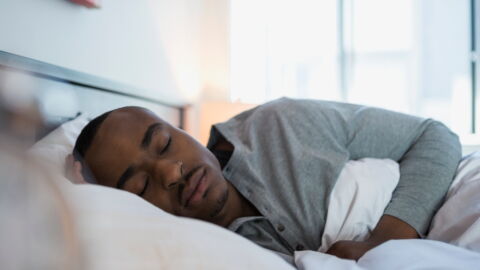It’s not always easy to get a good night’s sleep. Here are some ways you can ensure you start waking up fresh in the morning!
Discover our latest podcast
Respect your circadian rhythm
Keeping a consistent natural sleeping cycle is one of the most important things you can do to sleep better. It is key in ensuring that you wake up ready to attack the day in the morning.
Make sure you wake up and go to sleep at around roughly the same time each day. This helps your body regulate its inner clock and optimise your sleep quality. Go to bed as soon as you start feeling the fatigue at night and don’t spend time on your smartphone before dozing off.
Avoid sleeping in too much. Yes, we know that on the weekends it’s nice to get a couple of extra hours that you can’t normally enjoy during the week. However, it’s important to try and wake up not far off from your usual time to avoid a feeling similar to jetlag. If you’ve got a big night planned with your mates, the best thing to do is wake up at your usual time in the morning but then have a nap at the beginning of the afternoon.
A nap should remain a nap, not a full-blown sleep. Napping is an excellent way to catch up on a bit of sleep you may have lost the night before, however, it should not be so long as to completely disrupt your sleeping schedule. Naps should never last longer than 20 minutes.
Don’t fall asleep just after dinner. With your body digesting all of the food you’ve just eaten, it’s easy to feel a bit wiped. However, it’s critical to fight that temptation as you may fall asleep too early only to wake up in the middle of the night after the meal is processed.
The sun is your best friend
Melatonin is a naturally occurring hormone found within your brain. The levels in the body vary in relation to light exposure and help regulate the sleep cycle. The brain secretes more melatonin when there is no light present, therefore making the body fatigued. The opposite is true: when the body is exposed to light from a source like the Sun, the body becomes more alert.
Make an effort to spend more time outdoors, whether it’s having a coffee outside in the garden, playing a game of football with friends, or by simply taking a 5-minute break to take a walk outside during a lunch break.
Other significant sources of light are screens; be they mobile phones, televisions, or laptops. Reduce the brightness of your screen and try to avoid staring at one in the hour or two leading up to when you finally decide to sleep. Some suggest that enabling night mode or a blue light filter on mobile phones may even help to reduce the amount of light exposure and thus the impact on sleep.
If you happen to wake up in the middle of the night looking for a glass of water or to run to the loo, fight the urge to turn on the lights in your place. Try to keep the amount of guiding light you use to a minimum.
Get some exercise
Getting active and putting the body to work is an excellent way to improve sleep quality. Exhausting your body through physical exercise like going on a run will certainly make falling asleep at night a much easier task.
However, avoid exercising just before going to sleep. Even doing push-ups on the floor of your bedroom will noticeably raise the body temperature and increase cortisol levels.
Happiness is found in the stomach
What you consume throughout the day will drastically impact the quality of your sleep.
Avoid nicotine and caffeine if you’re looking to sleep well. Coffee in the morning upon waking up is fine, however, effects have been known to appear up to 12 hours after consumption. Smoking also is a leading factor of disrupting the body and disturbing the sleep.
Make sure you’re not eating too much fat, anything too spicy, as well as drinking too much alcohol before going to sleep. We know that it’s not always possible to do that (specifically the last one), but the three factors could upset the stomach and in some cases actually throw of sleep phases.















